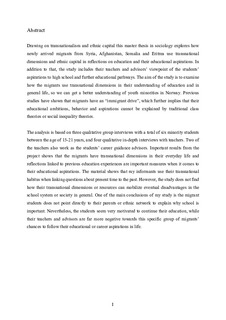| dc.description.abstract | Drawing on transnationalism and ethnic capital this master thesis in sociology explores how newly arrived migrants from Syria, Afghanistan, Somalia and Eritrea use transnational dimensions and ethnic capital in reflections on education and their educational aspirations. In addition to that, the study includes their teachers and advisors’ viewpoint of the students’ aspirations to high school and further educational pathways. The aim of the study is to examine how the migrants use transnational dimensions in their understanding of education and in general life, so we can get a better understanding of youth minorities in Norway. Previous studies have shown that migrants have an “immigrant drive”, which further implies that their educational ambitions, behavior and aspirations cannot be explained by traditional class theories or social inequality theories.
The analysis is based on three qualitative group interviews with a total of six minority students between the age of 15-21 years, and four qualitative in-depth interviews with teachers. Two of the teachers also work as the students’ career guidance advisors. Important results from the project shows that the migrants have transnational dimensions in their everyday life and reflections linked to previous education experiences are important measures when it comes to their educational aspirations. The material shows that my informants use their transnational habitus when linking questions about present time to the past. However, the study does not find how their transnational dimensions or resources can mobilize eventual disadvantages in the school system or society in general. One of the main conclusions of my study is the migrant students does not point directly to their parents or ethnic network to explain why school is important. Nevertheless, the students seem very motivated to continue their education, while their teachers and advisors are far more negative towards this specific group of migrants’ chances to follow their educational or career aspirations in life. | nb_NO |
